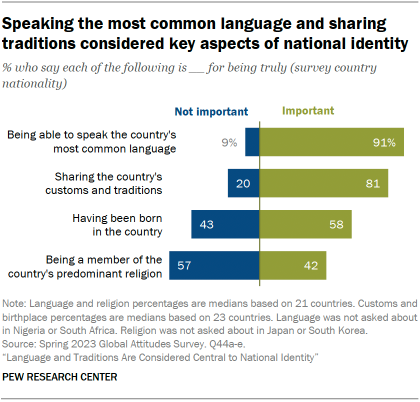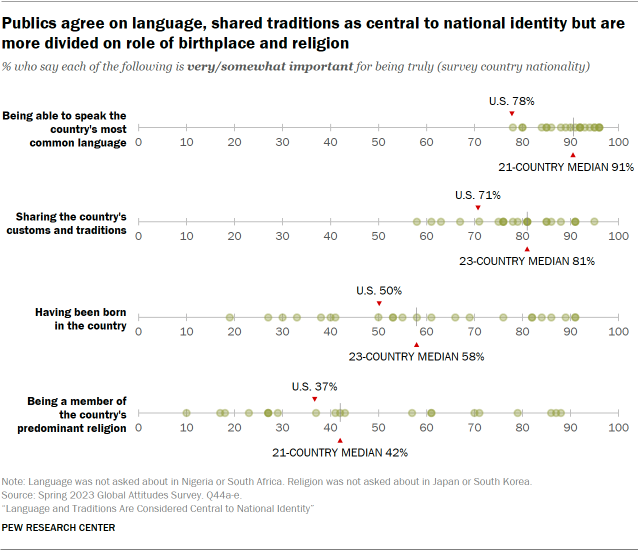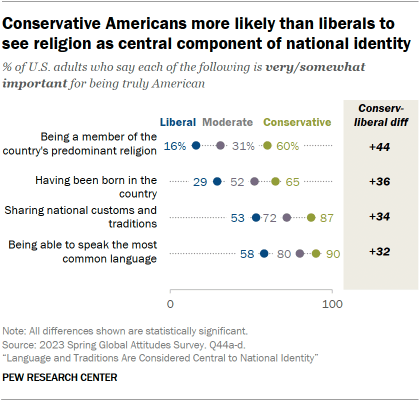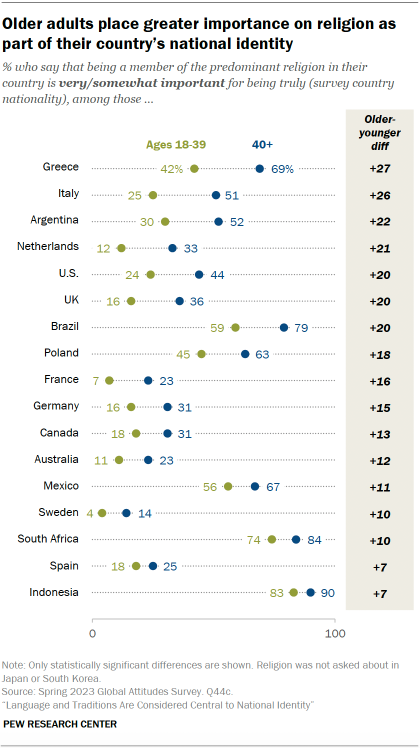
This Pew Research Center analysis explores attitudes on the importance of language, customs and traditions, birthplace, and religion as components of national identity in 23 countries in North America, Europe, the Middle East, the Asia-Pacific region, sub-Saharan Africa and Latin America. National identity is examined in the context of trend data. This is the first year since 2019 that the Global Attitudes Survey has included countries from Africa and Latin America due to the coronavirus outbreak.
The languages and religions we asked about in the survey vary by country and were determined with the input of local survey vendors. Refer to Appendix B for more information on the languages included in the survey and Appendix C for more on the religions included.
For non-U.S. data, this report draws on nationally representative surveys of a total of 24,674 adults conducted from Feb. 20 to May 22, 2023. All surveys were conducted over the phone with adults in Canada, France, Germany, Greece, Italy, Japan, the Netherlands, South Korea, Spain, Sweden and the United Kingdom. Surveys were conducted face-to-face in Hungary, Poland, Indonesia, Israel, Kenya, Nigeria, South Africa, Argentina, Brazil and Mexico. In Australia, we used a mixed-mode probability-based online panel.
In the United States, we surveyed 3,576 U.S. adults from March 20 to March 26, 2023. Everyone who took part in this survey is a member of the Center’s American Trends Panel (ATP), an online survey panel that is recruited through national, random sampling of residential addresses. This way nearly all U.S. adults have a chance of selection. The survey is weighted to be representative of the U.S. adult population by gender, race, ethnicity, partisan affiliation, education and other categories. Read more about the ATP’s methodology.
Here are the questions used for the report, along with responses, and the survey methodology.
Results of a Pew Research Center survey highlight language and customs as key components of national identity, while views on the importance of birthplace and religion are more divided.

Across more than 20 countries surveyed, a median of 91% say being able to speak their country’s most common language is important for being considered a true national, and 81% say sharing their country’s customs and traditions is important for true belonging. Views on the importance of birthplace and religion to national identity are mixed.
Of the four dimensions of national identity included in the survey, language is by far the most valued. In all countries where we asked about it, about eight-in-ten or more point to language as important for true belonging in the country. And in 13 countries, at least six-in-ten consider it a very important factor. (Explore more views about language in Chapter 1.)
Participation in a country’s customs and traditions is also valued: Around seven-in-ten or more consider sharing national customs and traditions important for true belonging in most countries. Emphasis on shared customs has declined somewhat since 2016, including by double digits in Germany, Japan and the United Kingdom. (Explore more views about customs and traditions in Chapter 2.)

The connection between birthplace and national identity is somewhat weaker. Majorities in about half of the countries say being born there is important for truly belonging. The middle-income countries surveyed place greater emphasis on birthplace than the high-income countries in the study. At least three-quarters in all seven middle-income countries believe being born in their country is important for being considered a true national. Notably, United Nations research has found that middle-income countries are home to a lower share of international migrants than high-income nations. (Explore more views about birthplace in Chapter 3.)
Views on religion as a component of national identity vary significantly across the nations surveyed, with several middle-income countries especially likely to consider it important. In contrast, fewer than one-in-four think being a member of the predominant religion is important to true belonging in the high-income countries of Australia, France, Spain and Sweden. (Explore more views about religion in Chapter 4.)
The United States stands out for having the lowest share who say speaking the country’s most common language is important for being a true national (78%). A relatively low share of Americans say the same about participating in the country’s traditions (71%). On the other hand, those in the U.S. place more emphasis on being a member of the country’s primary religion than people in most other high-income countries surveyed (37%). U.S. views on birthplace fall around the middle of the high-income countries (50%).
To compare how many dimensions respondents consider important for true belonging in each country, we created an index based on all four dimensions of national identity included in the survey. Using the index, Indonesians stand out as considering the greatest number of dimensions important for true belonging, while Sweden stands out as the nation with the fewest conditions. (For more information on the index, refer to Appendix A.)
These findings come from a Pew Research Center survey conducted from Feb. 20 to May 22, 2023, among 28,250 people in 23 countries.
Views by political ideology

Who counts as a true national is a partisan issue in many countries, and those on the ideological right generally consider more factors important for belonging.
The U.S. sees some of the greatest ideological divides, with conservative Americans at least 30 percentage points more likely than liberals to consider each component we asked about important for being truly American. The gap is most pronounced when it comes to religion: Conservatives are 44 points more likely than liberals to say being a Christian is important for being truly American.
Views by age, education and religion

Older adults tend to place greater importance on many of the components of national identity we asked about. The age divide is especially notable in Canada, Germany, Japan, South Korea, Sweden and the U.S., where older adults consider all factors included in the survey as more important for true belonging. For example, Canadians ages 40 and older are at least 10 points more likely than those ages 18 to 39 to label each dimension as important to Canadian identity.
Views also differ between those with more education and those with less. In most countries, those with less education tend to see being born in the country and being a member of the country’s primary religion as important components of national identity. Evaluations of the importance of customs and traditions also vary by education level in some countries, but no differences are present when it comes to the importance of language.
Religious identity is linked to views of national identity. Most, if not all, factors are seen as more important by members of the country’s primary religion in most places surveyed. In comparison, those who do not ascribe to the country’s most common religion place less importance on each factor. For example, in the U.S., Christians are more likely than those of other religious affiliations – including those who are atheist, agnostic or say their religion is “nothing in particular” – to see being Christian, being born in the U.S., speaking English, and sharing U.S. customs and traditions as important for being truly American.




